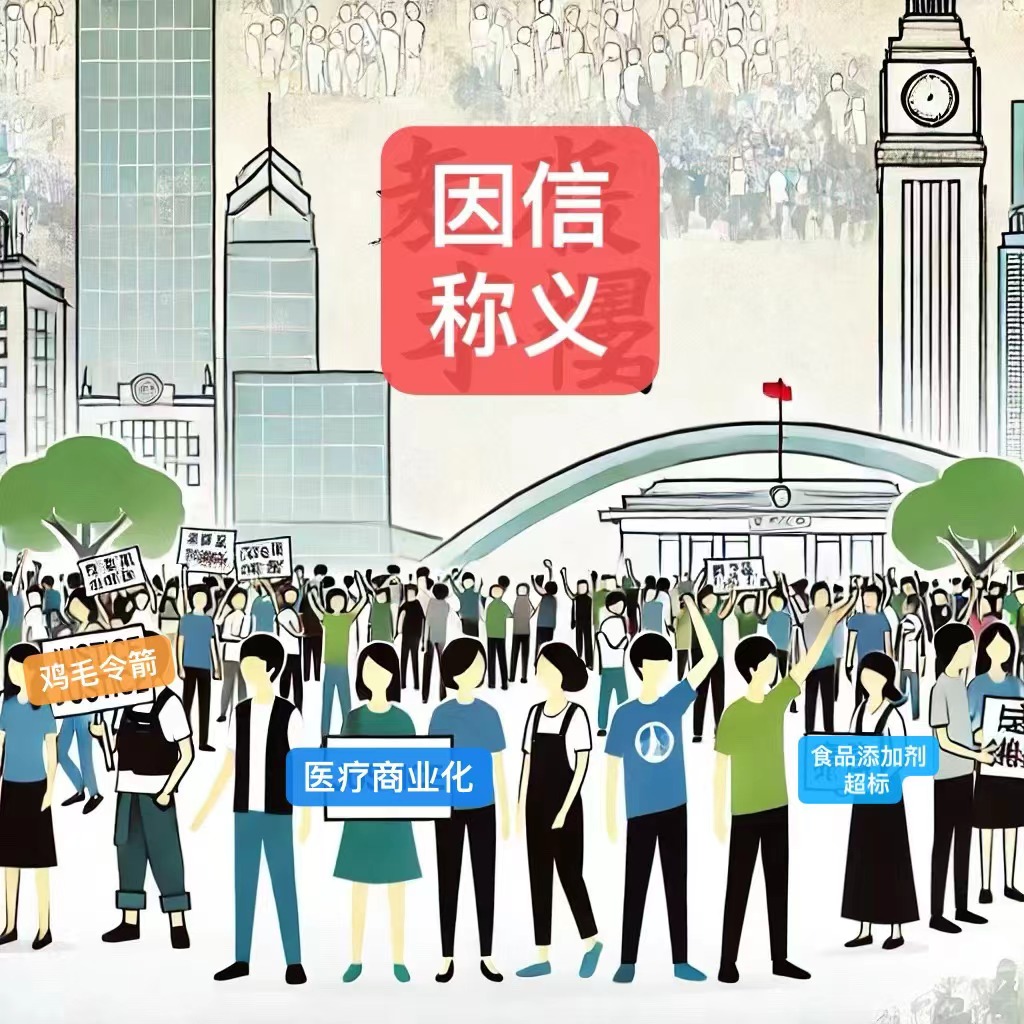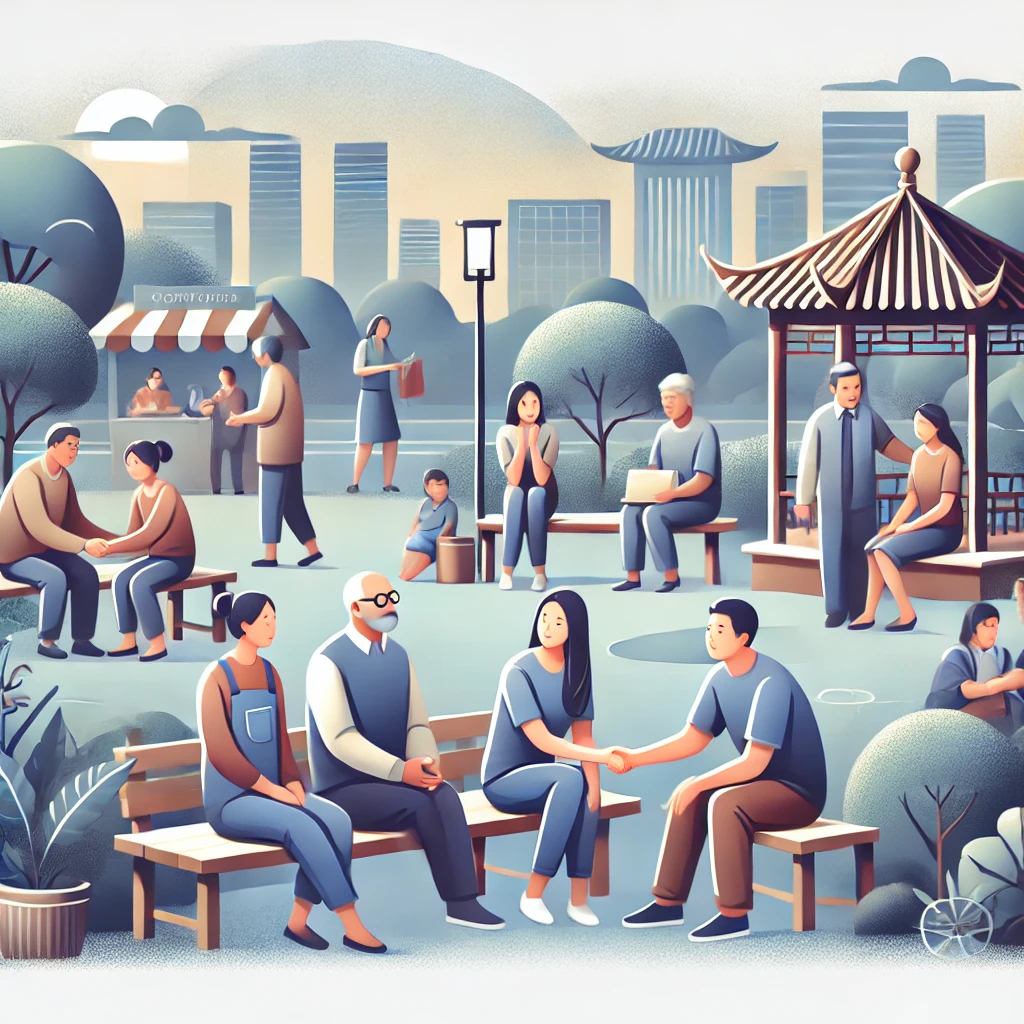无论你是否承认,这片土地上有不公义的现象,或称作扯淡的事。
先思考这样的问题,你会为发生在陌生人身上的苦难悲伤吗?你会怎么做?假如有一天你也成了那个深陷苦难的‘陌生人’,你希望其他陌生人怎么做?
下面虽然是对‘基督徒’讲话,实际却是和所有人的交流,或许很多‘基督徒’的冷漠会远超‘陌生人’......
在基督徒的信仰生活中,语言和行动都是表达信仰的重要工具。我们通过读经、祷告、敬拜和分享见证来建立与神的关系,但在面对社会上的不公义时,更需要勇敢地用语言发声。然而,仅有语言是不够的,仅仅在脑海中思考也是不够的,需要通过实际行动来验证。遗憾的是,更多的人却忘记了语言这一神赐的恩典,选择了‘观望和等待’,陌生人的苦难如同脑海中的一颗流星划过。希望今天的短文能给弟兄姐妹们提个醒,鼓励大家在这世界中坚定地为公义而站立。
1. 语言的天赋:人与动物的对比
语言是神赐予人类的一项独特天赋,它不仅用于沟通,更用于表达思想、信仰和情感。在危机时刻,动物会本能地为自己和同伴发出警告或求救声。这种简单而直接的行为正是对生命的保护和延续。
然而,作为被赋予语言能力的人类往往忽视了这一宝贵的天赋。我们选择沉默、观望,甚至在社会不公义面前保持缄默。这种沉默,是否可以称作‘精致的利己主义’?或许,这是一种逃避和自保的策略。但要知道,当我们选择不为公义发声,作为整体的社会将逐渐丧失自身的安全和自由。每一个沉默的选择,都是在削弱社会的正义感。
2. 精致的利己:语言的错用与沉默的代价
如果我们采取一种“事不关己,高高挂起”的态度,选择在不涉及自身利益时保持沉默,那么在社会的正义和良心逐渐被腐蚀时,我们自己也会成为最终的受害者。当我们面对不公和不义而不作声时,实际上是在为不公和不义开绿灯。如果有一天我们自身也处于弱势、需要别人替我们发声时,我们可能发现根本没有人愿意为我们站出来。
《我没有说话》是德国著名神学家兼信义宗牧师马丁·尼莫拉(Martin Niemöller)的一首诗。德文(1976年原文版):
Als die Nazis die Kommunisten holten,
habe ich geschwiegen;
ich war ja kein Kommunist.
Als sie die Sozialdemokraten einsperrten,
habe ich geschwiegen;
ich war ja kein Sozialdemokrat.
Als sie die Gewerkschafter holten,
habe ich nicht protestiert;
ich war ja kein Gewerkschafter.
Als sie die Juden holten,
habe ich geschwiegen;
ich war ja kein Jude.
Als sie mich holten,
gab es keinen mehr, der protestieren konnte.
翻译:
当纳粹分子抓住共产党人
我保持沉默;
我不是共产主义者。
当他们把社会民主党人关进监狱时
我保持沉默;
我不是社会民主党人。
当他们抓住工会的时候,
我没有抗议;
我不是工会会员。
当他们抓住犹太人时,
我保持沉默;
我不是犹太人。
当他们抓住我时,
再也没有人能抗议了。
现实生活中,有不少人,甚至包括一些基督徒,面对社会不公时选择保持沉默,或以“工作忙”、“顾及个人安全”等理由为借口,不愿发声。这其实就是在试图以自我为中心,选择在复杂的社会局势中“明哲保身”,这种态度的背后隐藏着更深的危机。
当越来越多的人选择不发声、不行动时,不公义就会蔓延,社会的正义感和信任感也会逐渐崩塌。正如马丁·路德·金所言:“不公义之处就是威胁到所有公义的地方。”在这种不公义的氛围中,每个人都可能成为受害者。那些曾经选择沉默的人,终究会发现,当他们需要帮助和支持时,周围却一片寂静。精致的利己主义看似保护了自己,实则是为自己掘墓。

3. 勇敢发声:用语言维护公义
语言是我们表达信仰和捍卫正义的重要工具。耶稣教导我们:“你们的话,是,就说是;不是,就说不是;若再多说,就是出于那恶者”(马太福音5:37)。基督徒的信仰不仅仅停留在心里,更应该通过我们所说的话、所采取的立场来表现。模棱两可的态度和犹豫不决的行为,绝不应该是一个基督门徒的特征。相反,我们被召唤成为真理的声音,可以为那些没有声音或声音微弱的人挺身而出,为社会的公义发声。基督徒被呼召要为孤儿、寡妇和弱势群体发声(雅各书1:27),为受压迫者伸冤(箴言31:8-9)。这不仅仅是道义的要求,更是对基督教信仰的一种实践和见证。耶稣在他传道的过程中,始终关心被社会边缘化的群体,给他们带来希望和救赎。作为他的追随者,我们也应当效法他的榜样。
在 神我们的父面前,那清洁没有玷污的虔诚,就是看顾在患难中的孤儿寡妇,并且保守自己不沾染世俗。(雅各书 1:27 和合本)
你当为哑巴开口,为一切孤独的伸冤。你当开口按公义判断,为困苦和穷乏的辨屈。(箴言 31:8-9 和合本)
在日常生活中,我们会遇到许多不公义的现象,比如弱势群体的权利被侵犯:贫困家庭被边缘化,妇女和儿童遭受暴力,职场中同事面对不公平待遇等。几十年来,人们对“个人隐私”和“私有财产”的概念模糊不清,导致本该‘按律当斩’的侵害行为被商品化的思维所掩盖,越来越多的侵害事件被忽视,罪犯得以逃避法律制裁。我们看到越来越多的人失踪(掩盖了抢劫罪、故意伤害罪、杀人罪等等),嫌疑人得以轻判,人们变得越来越沉默,这些都在助长恶行的蔓延,让更多的人无所顾忌地从事违法行为。
作为基督门徒的你怎么能忍心选择沉默呢?感谢那些在自媒体上用声音捍卫正义的人,他们冒着风险,挑战邪恶势力,为正义而战。每个人都可以在自己的能力范围内支持这些正义之声——即使只是一个简单的点赞或转发、评论,也可以帮助将重要的声音传播得更远。维护公义目前还不需要你‘拿起武器’,用我们的语言和行动就足够。
4. 行动为证:成为社会的守望者
尽管语言在捍卫公义中起着重要作用,但行动更能体现我们的信仰和价值观。正如雅各书2:17所言:“信心没有行为是死的。” 作为基督徒,我们的信仰不仅体现在我们的话语中,更要通过实际行动来体现对爱的坚持和对公义的捍卫。我们不能只是说“爱人如己”,却对那些有需要的陌生人视而不见。
可以在教会中发起和参与各种关爱活动,例如为贫困学生提供助学支持,为社区中的老年人和弱势群体提供帮助等。这些实际行动,尤其是教会带领者及同工的参与,能够更强有力地体现我们的信仰,同时承担起相应的社会责任和使命。国内很多有一定影响力的信徒,更应该成为公义的代言人,没有这样的‘义’做其底线,他的‘信’便是水上浮萍,他所讲的‘道’便是夸夸其谈。
在日常生活中,许多关乎民众切身利益的行业似乎更应反思自己的行为。例如,医疗医药行业、餐饮食品生产和加工行业、蔬菜水果种植和销售行业等,这些行业中从业者,不能再无视“潜规则”,也不能以所谓的“商业利益”为借口,继续从事那些对无辜人员身心健康构成威胁的行为。辛吉飞的出现,正是对这些行业中阴暗勾当的一面镜子。涉及我们身体健康的不义之举,人们是不是更应该应站出来支持正义,推动行业的透明和改革?
对于涉及民生问题的政策制定者和有权力惩治违法行为的权、贵部门,特别是城市管理人员,面对辛吉飞揭露的食品安全问题、对独树一帜的医疗商业化问题,以及各种不法添加剂等现象,是否已经采取行动,联合各部门严厉执法?
无论你信什么,都应该成为社会的守望者,这是我们的家园,我们不容许‘外敌’侵害,是不是也不应该让‘内敌’侵害?拍抗日神剧的财力和精力有万分之一拿出来给公务员治理乱象的工作发奖金都会立竿见影。

结语:
上面说的够多了,结语部分就不总结了。
说一件最近发生的事情,2024年8月28日起,中国宣布停止国际收养计划。自1991年12月29日《中华人民共和国收养法》颁布起,单单美国一个国家收养了11万中国儿童,其中80%为女婴及残障,具体细节就不叙述了,大家可以自己看新闻。
涉及本文所述问题为想说,当我们的眼睛盯着外面的‘敌人’时,也该低下头看看自己生存的环境,用心经营好自己灵魂和家园,把那份对这儿、对那儿的‘仇恨’逐渐变为对自己、家人乃至陌生人的关爱,那时候我们就会明白,有一种爱是我们在仇恨教育中难以理解和忘怀的:基督的爱!这才是一切‘公义’的基础。
我们就会慢慢理解为什么有人在抛弃残障儿,有人却在收养他们。基督信仰也不是可有可无的选择,而是一个人、一个家庭、一个民族、一个国家的根基。
愿每个弟兄姐妹一生都活在基督的爱中,并通过自己的人生活出这份爱,成为社会的祝福和希望。
让我们一起为此祷告!
(如有建议敬请留言讨论,邮箱:[email protected])
~~~*~~~
附一个我用App做的视频吧,有视觉效果:
Who Is Practicing Christ’s Love for the Helpless You?
No matter whether you admit it or not, there are injustices—or what some might call sheer nonsense—on this land.
First, consider this question: Would you grieve for the suffering befalling a stranger? What would you do? And if one day you yourself became that suffering “stranger,” how would you wish other strangers to act toward you?
Although the following words are addressed to “Christians,” they are, in truth, meant for everyone. Perhaps the indifference of many “Christians” exceeds that of other strangers…
In the spiritual life of a Christian, both language and action are vital tools for expressing faith. We build our relationship with God through Bible reading, prayer, worship, and sharing our testimonies. Yet when confronted with societal injustice, it is even more necessary to have the courage to speak out. However, words alone are not enough, and merely contemplating injustice in one’s mind will not suffice—a confirmation must come through concrete actions. Regrettably, many have forgotten this God-given gift of language and have opted instead to “watch and wait,” while the suffering of strangers passes like a fleeting meteor in their minds. I hope today’s short text serves as a reminder to all brothers and sisters and encourages everyone to stand firmly for justice in this world.
1. The Gift of Language: A Comparison Between Humans and Animals
Language is a unique gift bestowed upon humanity by God. It is not only a means of communication but also a way to express thoughts, beliefs, and emotions. In times of crisis, animals instinctively warn or call out for help for themselves and their companions—a simple, direct act meant to protect and perpetuate life.
Yet, we humans—with our God-given ability to speak—often take this precious gift for granted. We choose silence, we wait and observe, and even when faced with social injustice, we remain mute. Can this silence be called “refined selfishness”? Perhaps it is a strategy of evasion and self-preservation. But take note—when we choose not to speak out for justice, our society as a whole gradually loses its sense of safety and freedom. Every moment of silence weakens the overall spirit of justice in society.
2. Refined Selfishness: The Misuse of Language and the Cost of Silence
If we adopt an attitude of “it’s none of my business” and remain silent when our own interests are not directly affected, then as social justice and collective conscience are eroded, we ourselves will ultimately become the victims. By remaining silent in the face of injustice, we are effectively giving the green light for injustice to thrive. And if one day we find ourselves in a vulnerable position, needing someone to speak on our behalf, we might discover that no one is willing to stand up for us.
The poem “First They Came…” by the renowned German theologian and Lutheran pastor Martin Niemöller vividly illustrates this danger. (Below is a translation of the original German text, from its 1976 version):
When the Nazis came for the Communists, I remained silent; for I was not a Communist.
When they locked up the Social Democrats, I remained silent; for I was not a Social Democrat.
When they came for the trade unionists, I did not protest; for I was not a trade unionist.
When they came for the Jews, I remained silent; for I was not a Jew.
When they came for me, there was no one left to protest.
In everyday life, many people—even some Christians—choose to remain silent when faced with injustice, offering excuses such as “being too busy” or “worrying for personal safety.” In truth, this is an attempt to center on oneself and to “play it safe” amid complex social dynamics; behind such an attitude lies a deeper crisis.
When more and more people opt not to speak or act, injustice will spread, and society’s sense of justice and trust will gradually collapse. As Martin Luther King, Jr. once said, “Injustice anywhere is a threat to justice everywhere.” In such an environment, everyone may eventually end up as a victim. Those who once chose silence will find that when they need help and support, there is nothing but quiet all around. What appears to be refined selfishness, protecting oneself, is in fact digging a grave for oneself.

3. Bravely Speaking Out: Upholding Justice Through Words
Language is our crucial instrument for expressing faith and defending justice. Jesus taught, “All you need to say is simply ‘Yes’ or ‘No’; anything beyond this comes from the evil one” (Matthew 5:37). The Christian faith should not remain only in the heart but must be manifested in the words we speak and the positions we take. A vacillating attitude and indecisive behavior should never be characteristic of a disciple of Christ. On the contrary, we are called to be the voice of truth, to stand up for those who have no voice or whose voices are barely heard, and to speak out for social justice. Christians are called to advocate on behalf of orphans, widows, and the oppressed (James 1:27) and to speak up for those in distress (Proverbs 31:8–9). This is not only a moral imperative but also a practical expression and witness of the Christian faith. Throughout His ministry, Jesus cared deeply for society’s marginalized, bringing them hope and salvation. As His followers, we are to emulate His example.
For instance, in scripture it is written:
“Religion that God our Father accepts as pure and faultless is this: to look after orphans and widows in their distress and to keep oneself from being polluted by the world.” (James 1:27, NIV)
“Speak up for those who cannot speak for themselves, for the rights of all who are destitute. Speak up and judge fairly; defend the rights of the poor and needy.” (Proverbs 31:8–9, NIV)
In everyday life, we encounter numerous instances of injustice—for example, when the rights of the vulnerable are violated: marginalized poor families, women and children subjected to violence, and unfair treatment of colleagues in the workplace. Over the decades, the concept of “personal privacy” and “private property” has become muddled, allowing invasive behaviors that should be punished under the law to be hidden behind a mindset of commercialization. More and more incidents of infringement are ignored, and criminals escape legal punishment. We see ever more disappearances (covering up robbery, assault, murder, etc.), lenient sentences for suspects, and a general silence among the people—all of which feed the spread of wickedness and embolden further lawless behavior.
How can you, as a disciple of Christ, bear the thought of staying silent? I am grateful for those who use their voices on social media to defend justice. They risk much to challenge evil forces and fight for what is right. Each one of us, within our capabilities, can support these voices of justice—even if it is simply by liking, sharing, or commenting—to help spread these important messages further. Defending justice need not require “taking up arms”; our words and actions are sufficient for now.
4. Let Actions Speak: Becoming a Watchman for Society
Even though language plays an essential role in defending justice, it is ultimately our actions that best reflect our faith and values. As stated in James 2:17, “Faith by itself, if it is not accompanied by action, is dead.” As Christians, our faith is not only evident in our words but must also be demonstrated by practical actions that embody our commitment to love and our defense of justice. We should not only say “love your neighbor as yourself” while turning a blind eye to the suffering of those in need.
We can initiate and participate in various acts of compassion within our churches—such as providing educational support to impoverished students, helping the elderly and vulnerable in our communities, and so on. These tangible actions, especially when taken by church leaders and fellow believers, can powerfully manifest our faith and help us shoulder our social responsibilities and missions. Influential believers in our country, in particular, should serve as ambassadors for justice. Without a solid foundation of “righteousness,” one’s “faith” is nothing more than a drift on water, and the “word” that is preached becomes mere empty rhetoric.
In our daily lives, industries that affect people’s livelihoods should also reflect and review their practices. For instance, workers in the medical and pharmaceutical sectors, food production and processing, as well as those in the agriculture and fresh produce markets, must no longer ignore “unwritten rules” or hide behind the excuse of “commercial interests” while continuing harmful practices that threaten the physical and mental well-being of innocent people. The emergence of figures such as Xin Jifei serves as a mirror exposing the dark deeds within these industries. When injustice threatens our physical health, should we not be compelled to stand up for justice and push for transparency and reform within these sectors?
Policy-makers concerned with issues affecting people’s livelihoods, as well as authorities charged with punishing unlawful behavior— especially urban management personnel—must, when confronted with food safety issues exposed by Xin Jifei, the singular commercialization of healthcare, or the presence of various unlawful additives, take unified, strict action.
No matter what your faith may be, you should become a guardian of society. This is our home, and we must not allow “external enemies” to harm it—nor should we permit “internal enemies” to do the same. The resources and energy used to produce anti-Japanese war TV dramas, even if only a fraction of that were applied to awarding bonuses to officials for tackling corruption, would have an immediate and tangible impact.
Conclusion:
Enough has been said above; in the concluding section, there is no need for further summary.
Let me mention a recent event: starting August 28, 2024, China announced the cessation of its international adoption program. Since the promulgation of the Adoption Law of the People’s Republic of China on December 29, 1991, the United States alone has adopted 110,000 Chinese children—80% of whom were girls or children with disabilities. I will not go into further detail here; you can refer to the news for more information.
The issues discussed in this text are meant to convey that while our eyes remain fixed on the “enemy” outside, we must also look down to examine our own living environment. We should mindfully cultivate our souls and our homelands, transforming any “hatred” we may feel toward others into love for ourselves, our families, and even strangers. Only then will we come to understand the kind of love that, amid an education steeped in hatred, remains unforgettable—the love of Christ! This is the very foundation of all justice.
In time, we will gradually understand why some people choose to abandon disabled children while others opt to adopt them. Christian faith is not an optional extra; rather, it is the cornerstone for an individual, a family, a nation, and a people.
May every brother and sister live their life immersed in the love of Christ and, through their lives, manifest that love—becoming a blessing and hope to society.
Let us pray together for this cause!

发表回复